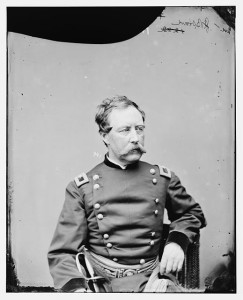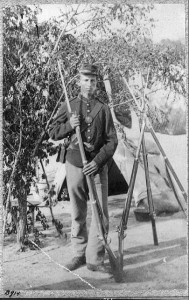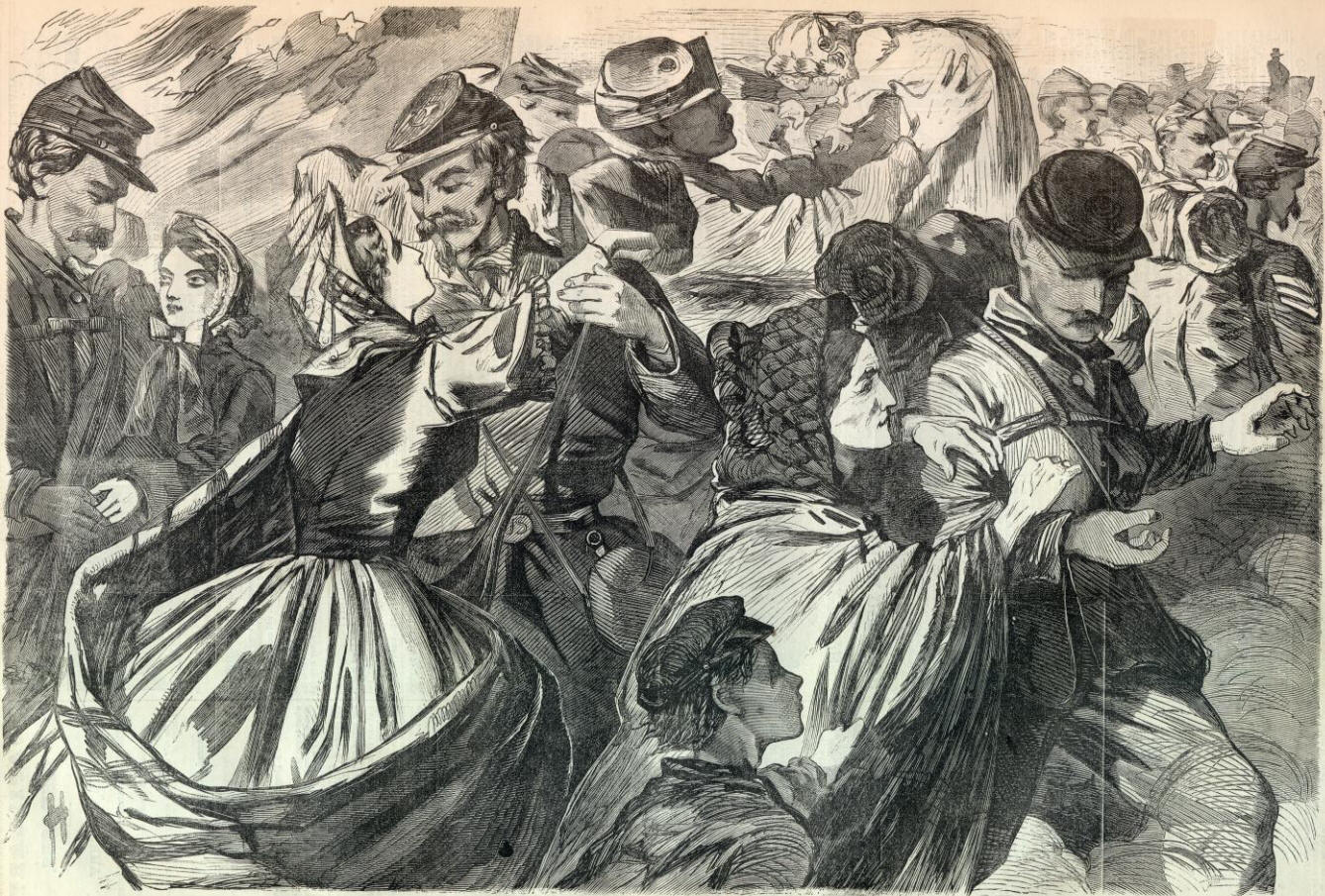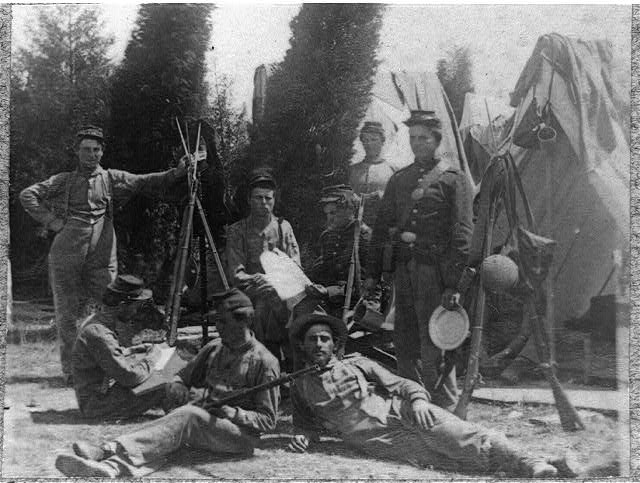On Tuesday, May 12, 1863, only about a week after its costliest engagements (during the Chancellorsville campaign), the 33rd New York Infantry Regiment received the word that it was officially being sent home [1]. It left the front on Friday, May 15, 1863 and reached Elmira, New York on Sunday, the 17th. On the 23rd of May the regiment took a boat up Seneca Lake to Geneva, where they were warmly greeted and feted:
…As the little steamer conveying the men hove into sight, they were greeted with the thunder of artillery, mingled with the chimes of the various church bells, and, on disembarking at the wharf, were met by the village authorities and a large deputation of citizens. After a few moments spent in congratulation, the Regiment formed in procession, and marched through the principal streets to the park …
Speeches and a huge meal at the barracks followed. On the next morning the regiment took the train to Canandaigua and was again treated to congratulatory speeches and a “sumptuous banquet”. Colonel Robert F. Taylor returned a flag the ladies of Canandaigua had presented the 33rd two years before. The colonel noted the extraordinary measure his men took to keep the ladies’ flag aloft, except once “when the color-bearer sank from sheer exhaustion on the field.”
On June 2, 1863 “Captain Beirn, of the regular service, assembled the Regiment on the green in front of the [Geneva] barracks, mustered it out of the service by Companies, and the Thirty-third passed into history.”
As can be seen from the following, the companies from Seneca Falls didn’t wait the week to leave Elmira and get home.
From a Seneca County, New York newspaper in May 1863:
Arrival of the Thirty-Third Regiment.
The gallant and glorious old Thirty-Third Regiment arrived at Elmira on Sunday last, after an absence of two years in the service of their country. The two companies from this place, Capts. Tyler and McGraw, are now at home enjoying themselves with all the freedom of times gone by. The boys look remarkably well, and their friends all seem pleased to see them once more. The Regiment will be mustered out in a very few days, their time being up to-day. We shall speak more at length of the Regiment in our next issue. In the meantime we publish the following complimentary orders, issued from the Army of the Potomac, upon their departure from home:
HEADQUARTERS 6th ARMY CORPS,
May 13, 1863.
Special Order No. 120.
The term of service of the 33d New York Vols. having expired, they will proceed at once to Elmira, N.Y., the place of enrollment, where they will be mustered out of the service. Upon their arrival there, their arms, equipments and public property will be turned in to the proper officers. The Quartermaster’s Department will furnish transportation from Falmouth.
The General commanding the corps congratulates the officers and men of the 33d New York Vols. upon their honorable return to civil life. They have enjoyed the respect and confidence of their companions and commanders; they have illustrated their term of service by galant deeds, and have won for themselves a reputation not surpassed in the Army of the Potomac, and have nobly earned the garatitude of the Republic.
By command of Maj. Gen. SEDGWICK,
M.T. MCMAHON,
Ass’t Adj’t. Gen’l.
___________
HEADQUARTERS 2d DIVISION, 6th CORPS,
May 14, 1863,
General Orders, No. 26.
By the rules of enlistment, the term of service of the 33d Regiment N.Y. Vols. expires to-day, and they are entitled to an honorable discharge from the service of the United States. Yet the General commanding the Division cannot let this regiment depart without expressing his regret at their leaving, and hopes that they will speedily reorganize and join this command, to serve their country once more and to the end of this war, with the same spirit as they have served for the last two years. To say that this regiment, in camp, on the march, and in all the many hard battles in which they were engaged, have done their duty and behaved gallantly, is but a weak expression of the acknowledgement of their good service. They have earned for themselves the approbation and confidence of their commanders, and fully deserve the gratitude of their country.
By order of Brig. Gen. Howe.
CHAS. MUNDER, Major and A.A.G.
___________
HEADQUARTERS 3d BRIGADE 2d DIVISION,
6th ARMY CORPS, May 14th, 1863.
CIRCULAR.
The Brigadier-General Commandind [sic] the Third Brigade, cannot part with the 33d New York Volunteers, without expressing to the officers and men of that gallant Regiment, who have fought under his eye and command with so much honor and distinction, his regret at our separation, his well wishes for your future.
No words can express what you must feel – the sense of having fought nobly for our country and suffered bravely for the cause. The memory of those who have fallen is tenderly cherished, and your Brigade Commander bids you “God Speed” in anything you may undertake in the future.
Sincerely,
THOMAS H. NEILL,
Brig. Gen. Com’g 3d Brigade
The image of the soldiers at home was published in the June 13, 1863 issue of Harper’s Weekly and can be seen at Son of the South.
General Sedgwick’s Assistant Adjutant General was Martin Thomas McMahon, who in 1891 was awarded the medal of honor for his heroism at the Battle of White Oak Swamp.
The mortality rate of the 33rd: “The total enrollment of the regiment was 1,220 members, of whom 47 were killed or died of wounds during the term of service and 105 died from accident, imprisonment or disease.” About 12.5%.
- [1]This summary is taken from Judd, David Wright The story of the Thirty-third N.Y.S. Vols, or, Two years campaigning in Virginia and Maryland . Rochester: Benton & Andrews, 1864. Print. pages 322-349.↩

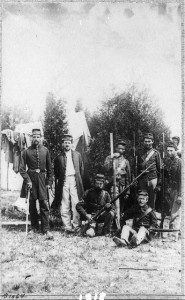
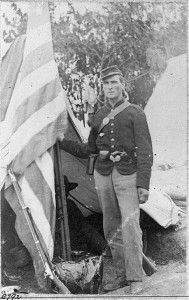
![Gen. Martin T. McMahon, U.S.A. (between 1860 and 1865]; LOC: LC-DIG-cwpbh-03178)](https://www.bluegrayreview.com/wp-content/uploads/2013/05/03178r-243x300.jpg)
